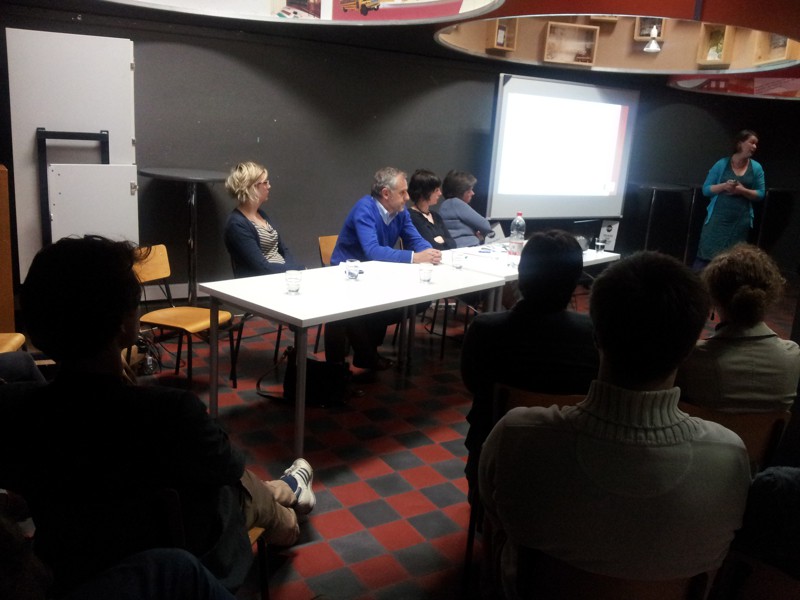Springtime news from ICRH Kenya
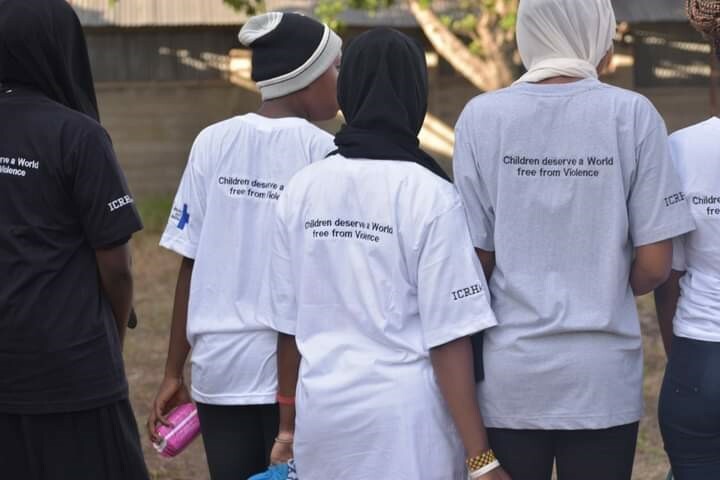
The ICRH Kenya team have a lot to share, please read their news here
ICRH Kenya welcomes new Country Director
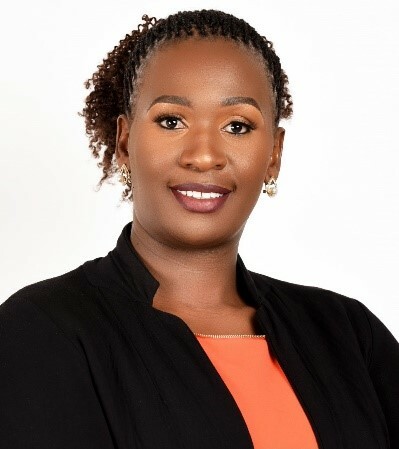 The ICRH Kenya Board recently announced the appointment of Dr. Susan Ontiri as the new Country Director. Dr. Ontiri is taking over from Dr. Griffins Manguro, who has been at the helm of ICRHK for the past four years, and who joined the Bill and Melinda Gates Foundation in Seattle, USA.
The ICRH Kenya Board recently announced the appointment of Dr. Susan Ontiri as the new Country Director. Dr. Ontiri is taking over from Dr. Griffins Manguro, who has been at the helm of ICRHK for the past four years, and who joined the Bill and Melinda Gates Foundation in Seattle, USA.
ICRHK sends best wishes to Dr. Griffins for continued success and fulfillment in all his future endeavors. We appreciate his invaluable contributions that have left an indelible mark on our organization.
The board expressed its pleasure on the appointment of Dr. Ontiri, who has more than 12 years of experience in working on integrated public health programs in Kenya and other sub-Saharan African countries. Dr. Ontiri's expertise is in Public Health, and working on integrated public health programs in Kenya and other sub-Saharan African countries, she has made significant contributions to various programs in the areas of family planning, maternal health, adolescent health, child survival, and environmental health. With her wealth of knowledge and experience in the field, the ICRHK board is confident that Dr. Ontiri will lead the organization to greater heights of progress and success in the field of reproductive health.
ICRH Kenya welcomes Jhpiego President to Makueni County
We welcomed Jhpiego President and CEO, Dr. Leslie Mancuso, to Makueni County, where ICRH Kenya has partnered with Jhpiego to 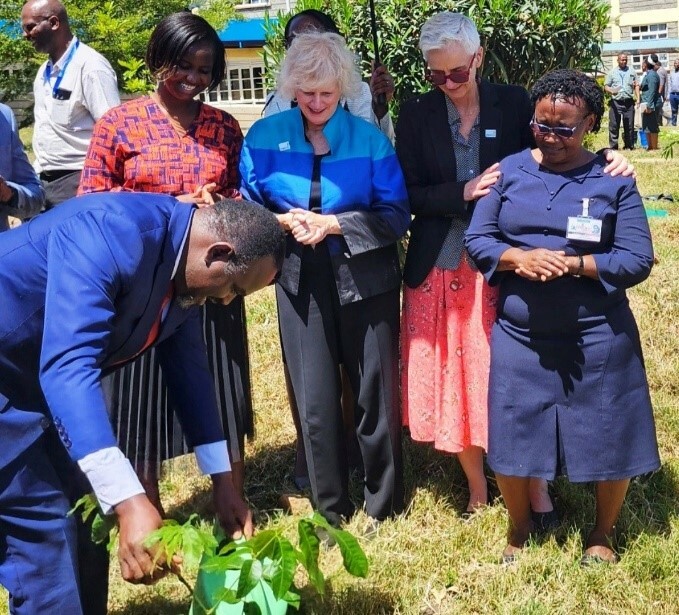 implement the Network of Care implementation research study.
implement the Network of Care implementation research study.
The Network of Care is part of the global Antenatal/Postnatal Care Research Collective studies and seeks to interconnect public and private health facilities to improve their efficiencies as part of improving overall maternal and newborn health outcomes. The team was received by H.E. The Deputy Governor and CEC Health for Makueni County, and discussed progress in maternal and newborn health in Makueni County.
Using storytelling to educate children on their protection rights
Through funding from Amplify Change, ICRH Kenya developed a child-friendly storybook titled Amara the Hero and Other Stories that elaborates the different challenges affecting child protection in the coastal region, while educating children on their rights to protection against violation.
ICRHK and the Department of Health organized nine book tours for the Amara storybook across nine schools within the Jomvu and Kisauni sub-counties, in collaboration with the Linda Mtoto Project. This in-house project runs life-skills programs in the selected schools as part of a child protection initiative.
We contracted a primary narrator to execute the tours, but to ascertain added buy-in and ownership, we also worked with 6 public health officers who were co-narrators and took the children through the concurrently running life-skills sessions. We had 450 children directly participate in the tours through narration and storytelling. We anticipate 6750 indirect beneficiaries to benefit from the storybook via engagement with library copies and peers. This storybook is the first of its kind in Mombasa County. We anticipate that it will be used as a benchmark for child-friendly programming at the county level.
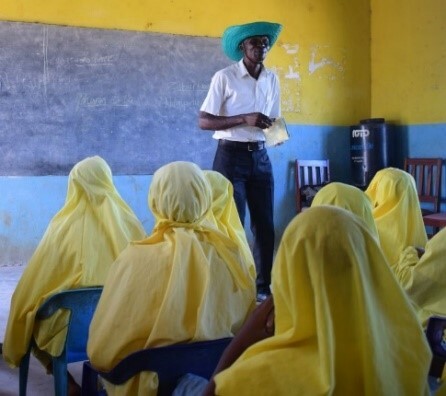 |
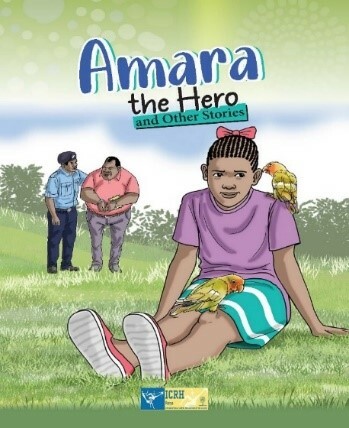 |
Improving access to quality HIV prevention and treatment
ICRH Kenya, in collaboration with NGO LVCT Health, has made significant progress in its commitment towards improving access to quality HIV prevention and treatment for key populations through the USAID STAWISHA PWANI project.
This project has reached 9556 key populations, including 7526 female sex workers, 1138 men who have sex with men, and 892 transgender persons, with clinical services both at drop-in centers and through outreach programs. Our project's effective implementation can be attributed to our commitment to spreading awareness about HIV prevention, enhancing access to prevention commodities, and delivering friendly sexual and reproductive health services. In addition to this, the peer educators and PrEP champions model has also played a crucial role in creating awareness through one-on-one interpersonal engagements and group awareness sessions. To date, ICRHK has enrolled 3343 individuals on PrEP.
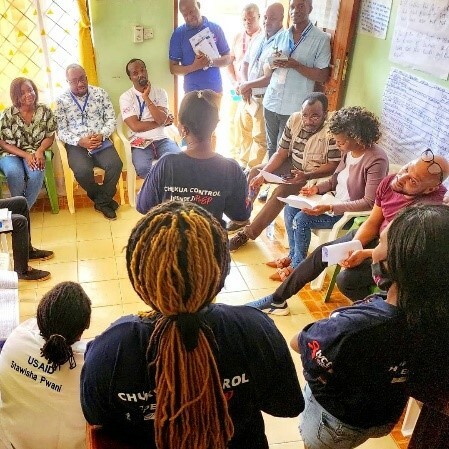 |
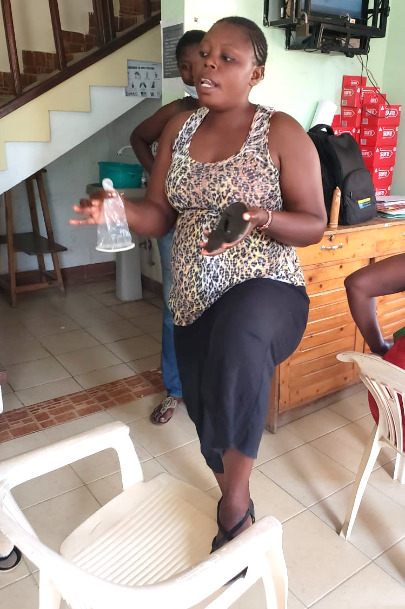 |
Family planning: promoting stakeholder engagements at the national level
ICRH Kenya was represented by the Performance Monitoring for Action (PMA) project at the national Family Planning Technical Working Group meeting hosted by the Division of Reproductive Maternal Health (DRMH). 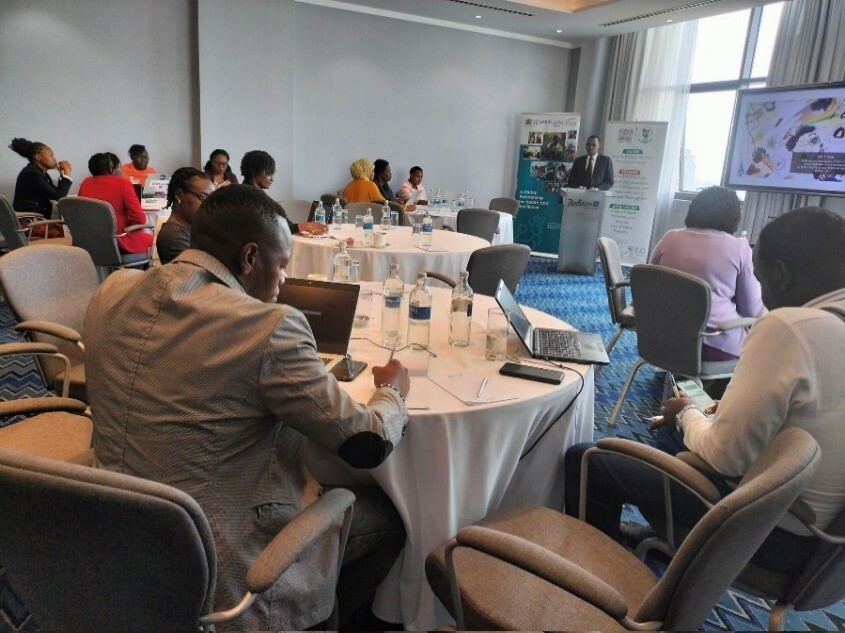 The objective was to bring together partners to discuss the current national family planning landscape and strategize on how to advance the family planning agenda.
The objective was to bring together partners to discuss the current national family planning landscape and strategize on how to advance the family planning agenda.
We participated in the national Family Planning Advocacy Technical Working Group meeting convened by the National Council for Population and Development and the Ministry of Health. The objective of the meeting was to celebrate the milestones, the family planning 2030 work plan dissemination and consensus meeting, the family planning commodity status at national and facility levels, and to review the family planning advocacy kit.
Capacity building to promote evidence use
ICRH Kenya conducted several capacity-building workshops to support data interrogation and analysis among other competencies at the national and county levels.
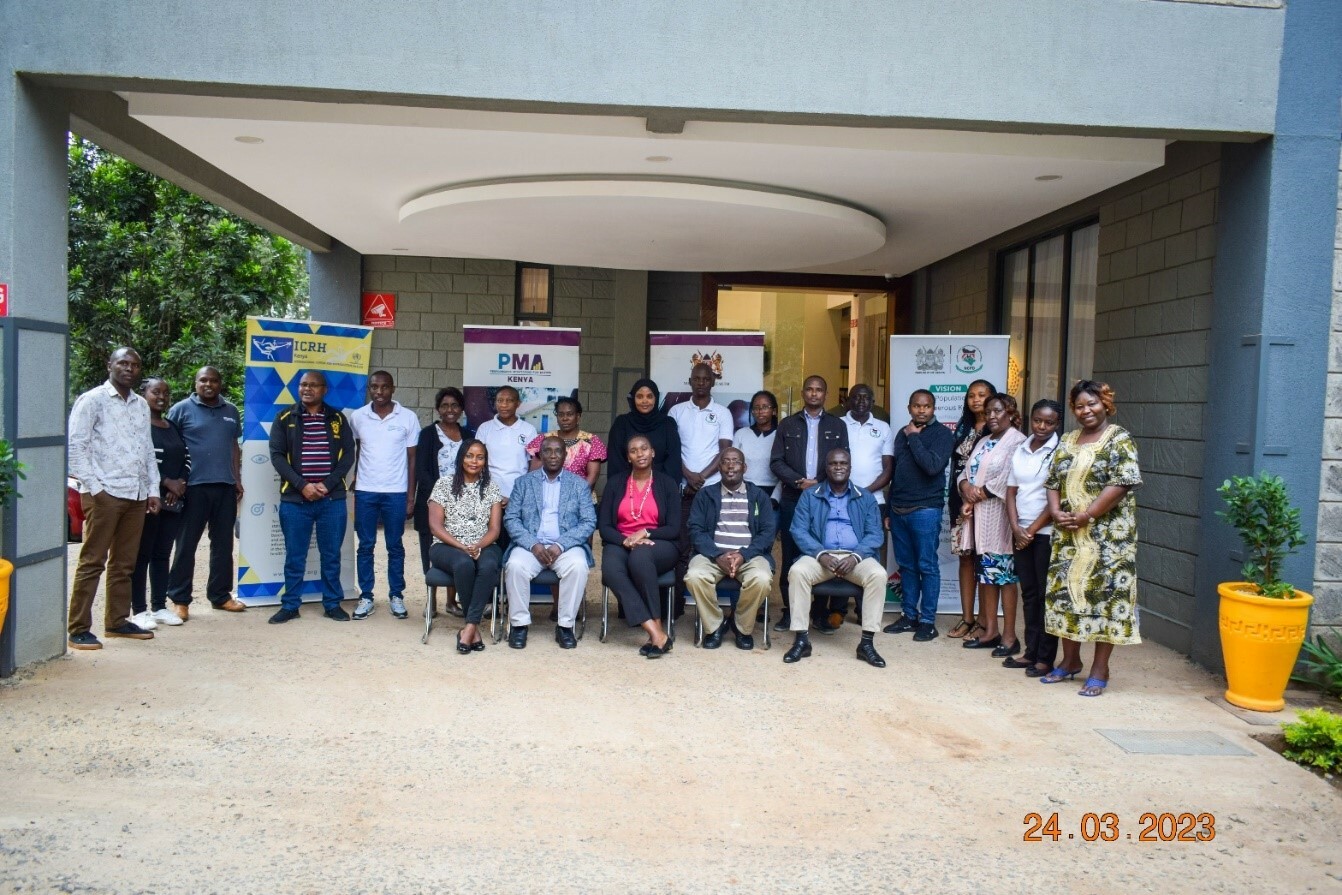 Through the Performance Monitoring for Action (PMA) project, we engaged the Nyamira County Health Management Team to offer technical support in the development of the FP Costed Implementation Plan and to ensure that the team is able to use evidence in the generation of the strategic document. We also conducted a data use workshop for the National Council for Population and Development to build their skills in analyzing, interpreting, and visualizing quantitative data.
Through the Performance Monitoring for Action (PMA) project, we engaged the Nyamira County Health Management Team to offer technical support in the development of the FP Costed Implementation Plan and to ensure that the team is able to use evidence in the generation of the strategic document. We also conducted a data use workshop for the National Council for Population and Development to build their skills in analyzing, interpreting, and visualizing quantitative data.
The Director for Technical Services at the National Council for Population and Development recognized that the training provided essential skills for the staff to contribute confidently and competently to the ongoing analysis at the agency. The Performance Monitoring for Action project also engaged the Makueni County Health Management Team during a data interrogation workshop that supported the County to develop an evidence-based action plan.
Advancing the Ministry of Health reproductive health priorities
Through our UNFPA funded program, ICRH Kenya has been partnering with the Ministry of Health to implement various activities for their Family Planning program. The government efforts towards attaining 100% funding through GDP and other national funds, and breaking away from donor reliance has witnessed dynamic changes in the Family Planning program, including the roll out of the commodity early warning system.
ICRHK supported the national dialogue workshop in Machakos that was convened to discuss maternal health, family planning, and adolescent sexual and reproductive health. The workshop was attended by representatives from 24 counties, and its objective was to disseminate the findings of the Kenya Demographic Health Survey 2022 while affirming the government's national priorities in sexual and reproductive health.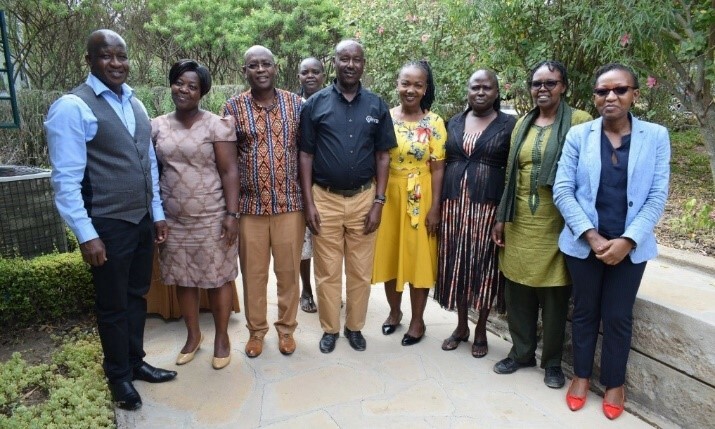
We also supported the roll out of the commodity early warning system and the logistics management information system for rationalizing, reporting and ordering of family planning commodities at county and sub-county level. These systems allow real time visualization of family planning stocks and increase efficiency in ordering, visibility and movement of commodities from central sites to the service delivery points where they are accessed by users.
This system increases commodity availability and access to the users. ICRHK is also a member of the Total Market Approach taskforce, a Ministry of Health initiative that is working towards increasing the efficiency of public and private sectors in providing family planning with the goal of ensuring equitable access to family planning for all.
Linda Mtoto Project: advancing life-skills sessions in schools
As part of implementing the in-school interventions, the Linda Mtoto Project rolled out life-skills sessions among 10 primary schools in collaboration with the Ministry of Education and the school health departments.
The life-skills sessions primarily focus on child protection, prevention and response to sexual violence. Additionally, the life-skills aim to provide psychosocial competencies and interpersonal skills to help make informed decisions, solve problems and build healthy relationships. The knowledge shared with the in-school peers is then cascaded to other peers using a peer-to-peer approach.
Child-led community awareness sessions
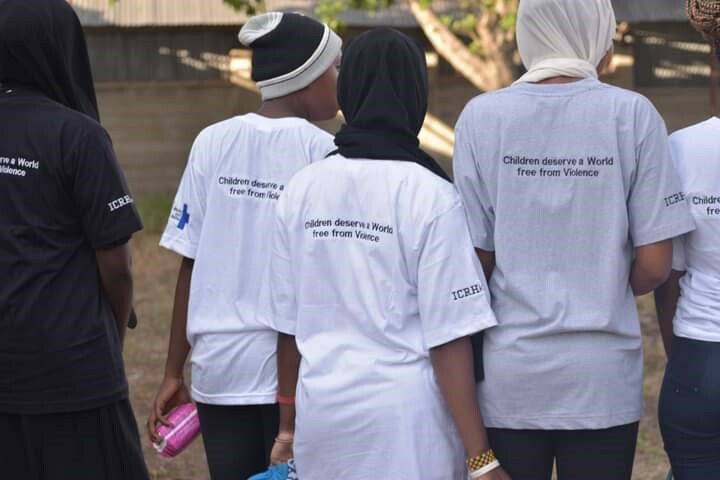 Within the quarter, child beneficiaries from Jomvu Sub-County ‘Jitoni & Narcol’ conducted a community awareness session on child protection. This was followed by a community clean up exercise within the same area. The activity promotes meaningful child participation among child beneficiaries in the Linda Mtoto Project.
Within the quarter, child beneficiaries from Jomvu Sub-County ‘Jitoni & Narcol’ conducted a community awareness session on child protection. This was followed by a community clean up exercise within the same area. The activity promotes meaningful child participation among child beneficiaries in the Linda Mtoto Project.
Collaboration for upcoming PMA Gender/GBV Study
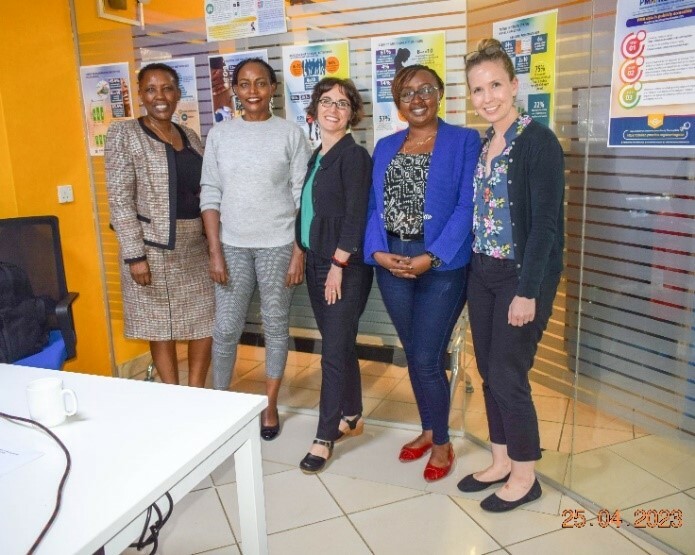 ICRH Kenya hosted the Performance Monitoring for Action (PMA) Gender project donors who visited our offices in preparation for the Performance Monitoring for Action Gender/Gender Based Violence study.
ICRH Kenya hosted the Performance Monitoring for Action (PMA) Gender project donors who visited our offices in preparation for the Performance Monitoring for Action Gender/Gender Based Violence study.
This study will be targeting youths and young adults between 15 to 28 years in Nairobi through a respondent-driven survey. The study will collect data on changes in sexual and reproductive health behaviours, and experiences related to safety and violence among youth and young adults in Nairobi, including changes since the last survey conducted in 2021.
Family planning: Third-Party Monitoring and Process Evaluation
Through the HERA consortium, ICRH Kenya has been involved in the Third Party Monitoring and Process Evaluation of the Delivering Equitable And Sustainable Increases In Family Planning (DESIP) project, implemented by a consortium of partners led by Population Services Kenya in 12 counties in Kenya.
The consortium collected data from 167 health facilities located in 9 counties. The data collection exercise involved conducting data quality assessments, interviews with the health facilities and reproductive health coordinators, and focus group discussions with community members. Further, interviews were held with the Ministry of Health national leadership, implementing partners, and other actors involved in family planning in the country to get insights on the family planning landscape in the country.
In addition, the consortium began the process of documenting a case study titled, ‘Role of men in uptake of Family Planning services among women in six DESIP supported counties in Kenya’. The aim of this assignment is to provide FCDO Kenya with timely, relevant feedback on the delivery and quality of DESIP outputs and outcome achievements.













